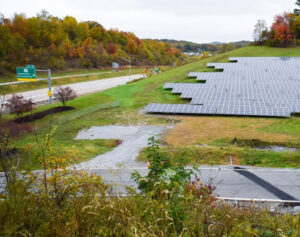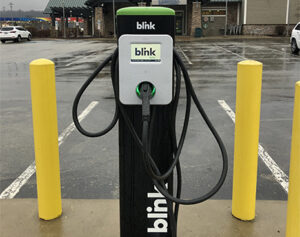 By Mark Compton
By Mark Compton
The Pennsylvania Turnpike Commission (PTC) believes that creating a sustainable future is the right thing to do – for our financial partners, customers, and planet.
In the face of financial pressure, sustainability can be considered “nice to have.” However, it’s increasingly clear that sound environmental decisions underpin solid fiscal management.
Here’s a real-life example. Consider your home’s electric bill. It’s higher than you’d like and the whole family needs to be more mindful. We parents know how kids can walk out of rooms with lights on and TVs blaring. Imagine if they shut them off each time we asked! There’d likely be noticeable savings on the next bill. The right thing to do financially is also environmentally responsible.
The PTC, like private sector employers, receives no tax dollars. Our expenses are offset by revenue – primarily tolls. For decades, conservative financial management served us well. Then, in 2007, Act 44 obligated us to redirect $450 million each year to PennDOT, requiring loans and annual toll increases to shore up credit ratings. Payments were reduced in 2022, though debt service continues. Addressing a burden that large required full organizational participation.
Act 44 obligated us to redirect $450 million each year to PennDOT, requiring loans and annual toll increases to shore up credit ratings. Payments were reduced in 2022, though debt service continues. Addressing a burden that large required full organizational participation.
By the 2010s, we were making sustainable changes, such as swapping halogen lights with money-saving LEDs and constructing energy-efficient buildings using green design principles.
In 2020, we created the PTC’s Sustainability Committee. Great efforts run the risk of becoming everyone and no one’s responsibility. A group of dedicated employees drive the strategy to ensure all projects are reviewed for economic, environmental, and social impacts using the United Nations’ 17 Sustainable Development Goals and Pennsylvania’s GreenGov Council standards. In addition, the committee regularly examines how employee training, departmental decision-making and policy drafting align with our key objectives. As a result, the PTC was the only state agency to earn a 100% rating from the GreenGov Council. It also produced the second annual Sustainability Report, providing an overview of our efforts and impact.
 Drivers choose to take the Pennsylvania Turnpike, so sustainability also means creating conditions that encourage that decision for decades ahead.
Drivers choose to take the Pennsylvania Turnpike, so sustainability also means creating conditions that encourage that decision for decades ahead.
Last year, the PTC reached a milestone when its first solar microgrid came online in Westmoreland County. Solar energy powers the multi-building maintenance facility campus in Greensburg, alongside a natural gas-run continuous generator. The microgrid provides energy independence, a new revenue stream as excess power is sold back to First Energy, and $450,000 in annual utility savings. This success propelled additional exploration of solar opportunities across our system. Two additional microgrid locations are planned and a solar canopy will be installed at the Middletown Central Administration Building (CAB).
The coming years will bring a surge in electric vehicle (EV) use. With 63 EV charging stations already installed at our service plazas, that number will grow as we partner with PennDOT and the Federal Highway Administration to leverage funding released under the Bipartisan Infrastructure Law and Inflation Reduction Act.
In March, I spoke at a legislative hearing on the Drive Smart Act, which would fund highway maintenance by applying mileage-based user fees to EVs. There, I noted our largest customers, delivery services, see inductive charging as driving commercial trucking’s future. This technology replenishes electric vehicles via pavement-embedded coils that signal on-board receivers. Successful implementation would revolutionize how people and goods transverse the country.
delivery services, see inductive charging as driving commercial trucking’s future. This technology replenishes electric vehicles via pavement-embedded coils that signal on-board receivers. Successful implementation would revolutionize how people and goods transverse the country.
The PTC’s planned 2029 inductive charging pilot along a section of the Mon/Fayette Expressway dovetails with the future needs of critical transportation partners, further illustrating that “sustainable” is environmentally and financially beneficial.
Closer to home, starting in 2024, the Commission will offer stationary inductive charging stations at the CAB, allowing its EV fleet to recharge while parked at terminals drawing energy from the solar canopy.
Sustainable change isn’t empowered by large projects alone! Businesses can make an impact by tweaking everyday tasks and routine processes.
At the PTC, water bottle refilling stations have saved thousands of plastic bottles from landfills.
“Follow-me” printing and online agenda managers reduced paper and toner expenditures. And yes, work-from-home arrangements – which we began in 2018 – have positively impacted our employee morale, retention, and organizational carbon footprint.
Compliance with state and federal practices around stormwater management used to be a labor-intensive, paper-based activity. In 2021, we launched the Documentation Inspection Reporting Technology (DIRT) app to streamline workflows. As a result, we’re on track to save 2,300 staff hours and $204,300 each year.
For more than 80 years, The Pennsylvania Turnpike Commission has proudly operated “America’s First Superhighway,” which surmounted physical progress barriers of the 1940s. As we drive toward becoming its first Sustainable Superhighway by 2040, the PTC is preparing for the next generation of transportation needs that will protect resources and our roadway for years to come.
Mark Compton is Chief Executive Officer at The Pennsylvania Turnpike Commission.